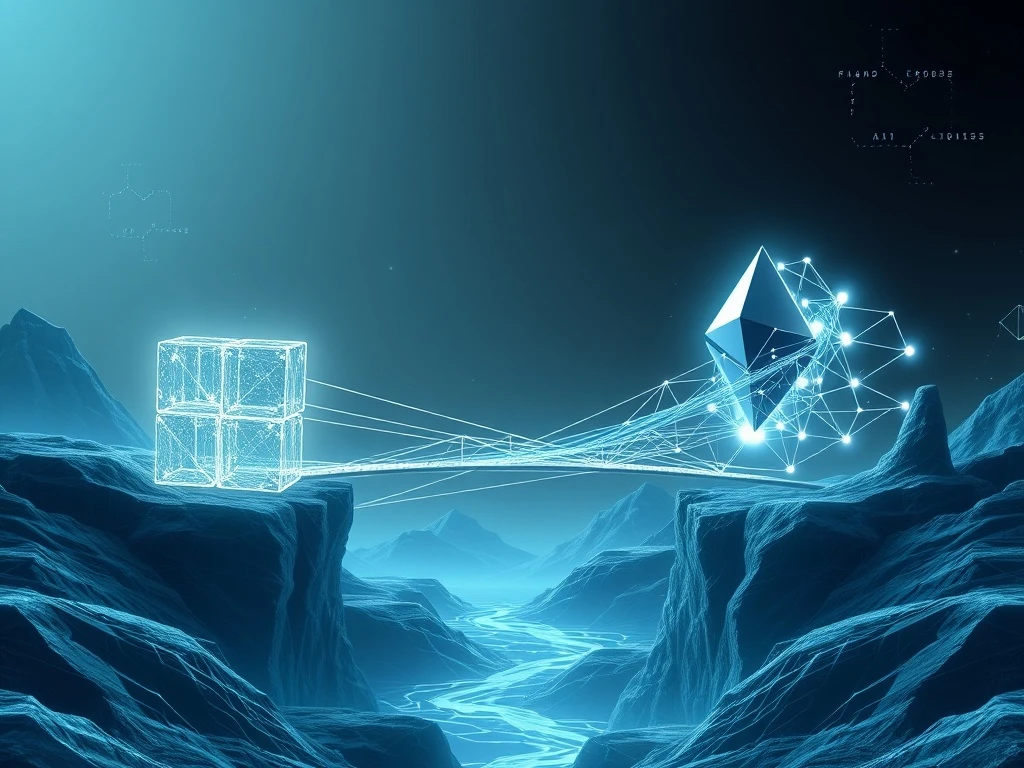Ethereum AI: Foundation Unveils Pioneering Research Team for a Decentralized Future

The digital landscape is rapidly evolving. Today, two powerful technologies, blockchain and artificial intelligence (AI), are converging. In a significant move, the **Ethereum Foundation** announced a new initiative. It formed an **Ethereum AI** research team. This team aims to blend the censorship-resistant power of blockchain with the transformative capabilities of AI. This development signals a new era for decentralized innovation. It also promises to reshape how intelligent systems interact and operate.
Pioneering the Future: The Ethereum AI Research Team
The **Ethereum Foundation** has taken a bold step. It officially announced the creation of a dedicated **Ethereum AI** research team. This team will drive crucial advancements at the intersection of these two fields. Research scientist Davide Crapis will lead the new unit. He brings extensive expertise to this groundbreaking endeavor. The team’s primary goal involves supporting projects. These projects seek to create a robust ecosystem for both humans and AI. Ultimately, they aim to foster a symbiotic relationship between these entities on the Ethereum network.
Moreover, the team has a clear mandate. Its focus centers on developing an **AI economy on Ethereum**. It also aims to build a decentralized **AI stack** for developers. Crapis emphasized the mutual benefits of this integration. He stated, “Ethereum makes AI more trustworthy, and AI makes Ethereum more useful.” This perspective highlights a core belief. A neutral base layer is essential for intelligent agents. They need it for value exchange and reputation management. Consequently, Ethereum stands to become that foundational layer. AI benefits by avoiding dependence on centralized platforms. The **Ethereum Foundation** is actively staffing this new dAI team. They are seeking an AI researcher and a project manager. These roles will drive coordination and research efforts.
Why Blockchain AI? A Foundation for Trust
The synergy between blockchain and AI offers compelling advantages. Crapis articulated this vision clearly. He explained that as more intelligent agents transact, their need for a neutral, reliable base layer grows. This is where Ethereum excels. It provides an immutable and transparent ledger. Therefore, it offers unparalleled trustworthiness for AI operations. This ensures that AI systems operate within a verifiable framework. It minimizes risks associated with opaque, centralized systems.
Furthermore, **decentralized AI** systems offer inherent benefits. They enhance transparency and auditability. They also reduce single points of failure. This makes AI applications more resilient. Such an environment is critical for complex AI agents. These agents make decisions with minimal human oversight. They execute transactions autonomously. By leveraging Ethereum, these **AI agents** can achieve greater security. They can also maintain higher integrity. This vision aligns perfectly with the core principles of Web3. It champions decentralization and user empowerment.
Empowering AI Agents with ERC-8004
A key focus for the new team involves advancing existing work. Specifically, they will continue efforts on ERC-8004. This proposal was co-authored by Crapis, Marco De Rossi, and Jordan Ellis. ERC-8004 seeks to extend the AI agent-to-agent (A2A) protocol. It aims to create a trust layer for discovering and interacting with **AI agents**. These programs operate with minimal human supervision. They execute transactions and function on behalf of their programmers. Blockchains with programmable features, like smart contracts, are ideal for these sophisticated programs.
Consequently, the **Ethereum Foundation** will actively support projects. These projects aim to transform Ethereum into a dynamic ecosystem. This ecosystem will seamlessly involve both AI and humans. AI agents have become a focal point. They integrate blockchain technology and artificial intelligence. They facilitate automated decision-making and transaction execution. This marks a significant leap in autonomous digital operations.
Moreover, **AI agents** can efficiently manage settlements. Settlements represent the final step in a transaction. Assets are transferred between two parties. This capability is vital for a robust digital economy. Ethereum’s infrastructure provides a solid foundation for these operations. It ensures secure and verifiable transfers. This enhances the overall efficiency and reliability of AI-driven processes.
Ethereum’s Robust Settlement Layer for AI Transactions
Ethereum’s network activity underscores its readiness for this integration. According to blockchain analytics company CryptoQuant, Ethereum daily smart contract calls reached 12 million on a recent Thursday. This figure reinforces the blockchain’s critical role. It functions as a programmable settlement layer. This high volume demonstrates Ethereum’s capacity. It can handle complex and frequent interactions. These interactions are characteristic of an **AI economy on Ethereum**.
CryptoQuant further reported on the network’s health. They stated, “Network activity is in expansion mode.” Ethereum’s total transactions and active addresses have reached record highs. This highlights expanding adoption across various sectors. These include DeFi, stablecoin transfers, and token activity. Such growth validates the **Ethereum Foundation**’s decision. Ethereum offers a proven, scalable platform for advanced AI applications. Its robust infrastructure ensures that **AI agents** can operate effectively and securely.
The Broader Landscape of Blockchain AI Convergence
The convergence of AI and blockchain is a growing trend. Tech researchers highlight how blockchain technology strengthens AI. It provides essential features like decentralization, immutability, and identity verification. These attributes address key weaknesses in traditional AI systems. Therefore, they enhance trust and security. This integration creates more resilient and transparent AI applications.
Various Web3 organizations are actively blending these two technologies. For instance, in 2024, Matchain launched its decentralized **AI blockchain**. Similarly, in February 2025, KiteAI announced the debut of an AI-driven blockchain within the Avalanche ecosystem. These initiatives demonstrate a broader industry movement. They seek to harness the combined power of AI and distributed ledger technology. This collective effort promises significant advancements.
Ultimately, this convergence holds immense potential. Arunkumar Krishnakumar, head of institutional growth and RWAs at Kamino Finance, believes this. He stated that **AI agents** and blockchain technology could redefine the digital economy. The **Ethereum Foundation**’s new research team stands at the forefront of this revolution. Their work will undoubtedly shape the future of intelligent, decentralized systems. This pioneering initiative sets a powerful precedent. It showcases the transformative power of combining blockchain’s integrity with AI’s intelligence. This synergy will unlock unprecedented possibilities for innovation and trust in the digital realm.








